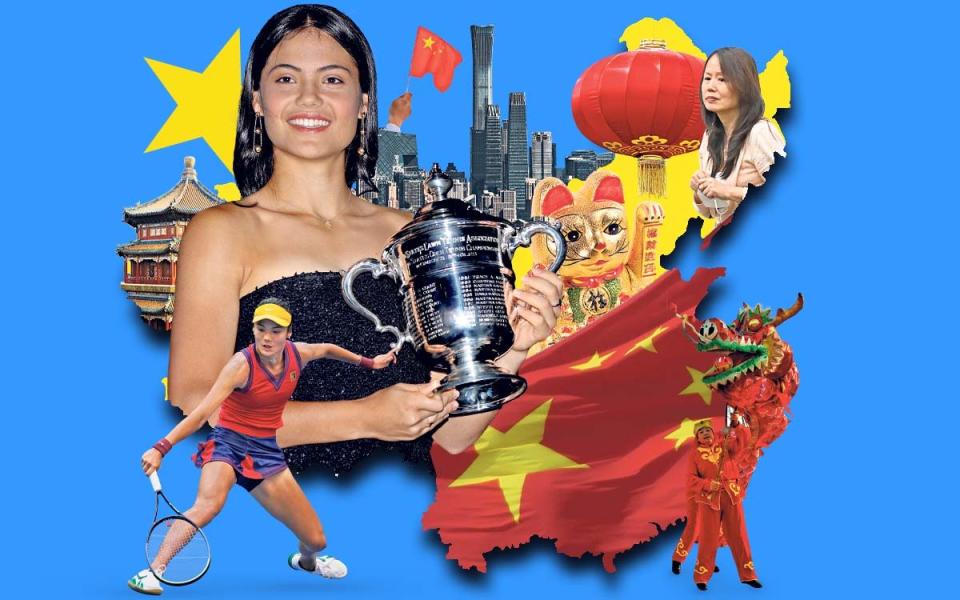China is claiming Emma Radacanu as their 'dongbei' girl – so what could it mean for her?

As messages of thanks go, few can have been as widely shared. When the new US Open tennis champion Emma Raducanu issued a statement on Instagram on Saturday night, thanking the Chinese branch of her family for their support, it didn’t so much go viral as start an internet pandemic. Within 48 hours some 600 million views had been registered. It wasn’t just that it was so charmingly delivered – it was the fact Raducanu spoke in fluent Mandarin that made so many take note.
The speed with which the 18-year-old from Bromley has become an international sensation will have been generating furtive excitement in marketing departments across the globe; she has already been dubbed the ‘Dongbei girl’ in China, a nod to her north-eastern heritage. Raducanu herself may be delightfully unconcerned about the monetary implications of her astonishing victory last weekend, insisting that she hadn’t the first clue about her next step beyond using some of her £1.9 million winner’s cheque to buy a new pair of AirPods for her iPhone. But for those who concern themselves with sporting branding, her potential is beyond compare. Young, immensely talented, successful, photogenic – and she speaks the language of the world’s most voracious market. What’s not to like?
“For foreign brands wanting to make a mark in China – maybe someone like BMW or Audi – she is undoubtedly a boon,” says Simon Chadwick, professor of Eurasian sport at the Lyon Business School. “Young people will want to be like her, she is a hugely valuable brand. But China is very complicated. Anyone thinking just because she can speak Mandarin she is going to make billions is not wholly understanding the Chinese market.”
Even Chadwick acknowledges, however, that in China, where the clip was shared millions of times on the social media platform Weibo, the response was significant. There is an unwritten acceptance in the country that Mandarin is the most complicated of languages to master. When a foreigner manages to say as much as hello in the local tongue they are fêted. So for Raducanu, who was born and raised thousands of miles to the west, to speak it with such ease, a trace of a Dongbei accent in her vowels, was immediately to put her on another level from other foreign celebrities.
Her facility with the language comes from her mother, Dong Mei Zhai, who these days prefers the western moniker Renee. She hails from Shenyang, a city in the north eastern state of Dongbei, near the North Korean border. Until Covid struck, Raducanu would spend her summer holidays visiting her grandmother in Shenyang, latterly training at the Institute of Physical Education, playing against the local youth. She has not been there since the summer of 2019, when she was merely a promising young tennis enthusiast from south London. Now she is the world’s breakthrough sporting superstar, which is of real interest in Beijing.
The government of Xi Jinping has long adhered to the belief that sport can be a significant tool of political and economic development. The 2008 Olympics were designed as a statement of Chinese efficiency and modernity; hosting the Winter Olympics next February will demonstrate how much further the nation has advanced in 12 years. Meanwhile, President Xi has given his sporting bureaucrats a stark order: China should win the World Cup by 2050.

But one thing Xi’s government has not been able to do thus far is create any meaningful stars of its own. Huge monetary investment in football has barely paid off, with the domestic league beset by scandal and under-performance, the national team no closer to international dominance. And, while they may be holding the Winter Games in Beijing next year, there has hardly been an over abundance in competitive Chinese ski jumpers or ice skaters in recent years. Indeed, walking through Beijing or Shanghai is to be struck by how few of the locals actually engage in sport, beyond table tennis, jogging and tai-chi.
So when a ready-made sporting superstar of Chinese descent suddenly and dramatically appears on the scene, the rush to count her as one of their own is obvious. She may be what Xi refers to as an “overseas Chinese”, rather than part of the Han majority that increasing Chinese nationalism promotes, but she is still attached by convention and value systems contributing to her success.
For China-watchers, it is significant that the state media has been so enthusiastic not just about her victory as about her statement in Mandarin. Tennis is regarded by some in government as the kind of bourgeois pursuit that should not be encouraged. But it was not so much the fact she was speaking the language as what she was saying that was so lauded in the country. Her acknowledgement of the strengths she drew from her heritage – the work ethic, the self-belief, the embrace of discipline and determination she took from her mother – read like a manual of the Chinese idea of themselves. She may have been brought up in the west, was the widespread consensus on social media, but the reason she has become a champion is because of her Chinese core.

Official messaging even got to work with her fondness, while on trips to visit her grandmother, for taking on the local professional table tennis players at the Shenyang Institute. It was that quirk, apparently, “which improved her abilities” in her chosen game as much as any other.
For those plotting Raducanu’s career this has huge commercial implications. For most of her contemporaries, the next stage in life is working out which university to go to. For her the immediate future is one in which she will require all of the skill inherent in picking up an A* in A-level maths this summer just to keep up with the zeroes appearing on her bank statement. Endorsements across the Chinese market can be enormously valuable. Personal appearances – when pandemic restrictions allow – would be particularly lucrative. Premier League clubs have long visited Shanghai and Beijing to play in pre-season friendlies. Imagine the value of Raducanu not only playing on one of the new show courts in the country but after the match addressing the crowd in their own tongue.
Such lucrative possibility does come with a price, however. When the former Arsenal footballer Mesut Özil tweeted his support for Uighurs in 2019, he was warned by his financial advisers he might be in danger of losing some endorsements. Well, that was one way of putting it. He was cancelled in the most extreme fashion, his avatar removed from video games, the two Chinese state broadcasters with rights to Premier League content refused to screen Arsenal matches and a search for his name on the internet brought up error messages.
This has happened many times in the past to foreign celebrities from all industries. Even things said years ago can be archived up. This is happening right now to Canadian Chinese actor Simu Liu, who stars in Marvel’s latest blockbuster Shang Chi; the same happened to Chloé Zhao of Nomadland – both said unflattering things 5-10 years ago about China, and that was enough for censors to come down hard. Once you get famous, the censors and Chinese public start trawling for any moment you might have been critical about the regime.
From Naomi Osaka’s statements about mental health and LBGTQ rights to Novak Djokovic’s vaccine scepticism, tennis players have latterly become far more prepared to champion issues beyond the baseline. Raducanu’s cheery, happy-go-lucky countenance does not so far appear to have much interest in political controversy – which, Chadwick suggests, is probably allowing her financial advisers to sleep at night. When it comes to China, in order to succeed commercially, it is best to keep schtum.
Additional reporting by Sophia Yan and Wen Xu

